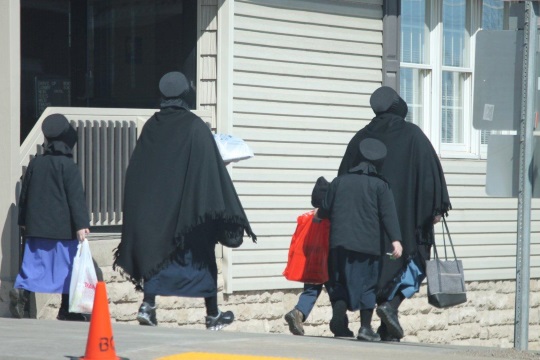Ask an Amishman: What do the Amish think about Jews?
And for that matter, people of other faiths?
Our Lancaster Amish correspondent has weighed in on the question, recently submitted by a curious reader.
Here is his response:
One of the most important lessons that I learned was taught to me by a Jewish businessman, in that he said there are no problems, merely situations that need solutions. Jewish people are unique human beings,just like everyone else (sounds like a saying of Yogi Berra). Culturally and historically Jews and the Amish have much in common, in that both suffered much persecution in their history and both have meaningful traditions.
Recently I along with a number of Amish bishops,ministers, laypeople, and their wives, took a tour of the Holocaust museum in D.C. It was a profound and moving experience. How is it possible that this happened less than 75 years ago, in one of the most civilized nations on earth. Truly all that is necessary for evil to gain the upper hand is for civilized people to compromise their beliefs and do nothing. Then the haunting question comes to mind, could it happen again. While we want to appreciate any respite from persecution we get, may we never become the persecutors.
Theologically the Amish are Christocentric, while the Jewish people generally are not.
Although the Amish take following Jesus seriously that doesn’t mean we condemn the Jews or anyone else of any other faith. The Amish do not send anyone to hell. They can’t, and neither can anyone else, which is a good thing. We have great respect for any faith that teaches its adherents to Honor and Obey God and to love others.
With all that being said, I should make several points to fully convey what the Amish typically feel about other faiths in general. First we do not believe that all paths lead to God.Yet we acknowledge that everyone has a unique path. God is a rewarder of all who seek him, and will not turn his back on any of his creations. However if you or I turn our backs on God and follow a path away from God, the logical conclusion can only be that God cannot be found in such a way.
The second point is the Amish are not relativists. We have definite ideas about right and wrong, truth and lies. However the Bible is a mirror we should use to examine our lives with, and not a spotlight to shine on others and try to figure out who is going to hell and who is going to heaven.
When thinking about right and wrong, the focus should be on ourselves first of all. This life here on earth involves a lot of different relationships, but ultimately in the end, on judgment day, it will be each person alone with God. We will not be able to blame our shortcomings on anyone else, tormentors, persecutors, parents, siblings, bishops, pastors, teachers,or anyone else. Neither will we be able to put in a good word for anyone.
In conclusion we love God because he first loved us, and we should seek his grace rather than his favor, which is reason enough not to judge. We acknowledge we are imperfect, and sinners who need help (grace). The Amish do not judge those of other faiths and denominations, but are not inclined to compromise their own beliefs merely to be accommodating. And to refute a certain stereotype, the Amish do not believe they are the only right ones and all the others wrong.








Yes indeed it is well spoken. To many times we blame everyone but us for how we are or what we do. And we like to nit pick everyone else’s faults while ignoring our own. This is something I believe that ties in with your post. *You don’t always have a choice what happens to you in life, but you do have a choice in how you react to it.*
Could somebody please tell me how I can find an Amish wife? I’m a single,never married Jewish Christian who loves farming, always being here for a woman, showing her over 350% respect and attention AT ALL TIMES, am handsome (can provide pic), 53, totally out of debt, have job security in the medical field for my entire life…The Amish are the best…need companionship in my life…ty, Evan:508-376-1048; evanbgessman@gmail.com. I seldom check my email, so calling me would be the best way to reach me…Evan
I agree with EVAN B
I have always wanted to meet an Amish wife as well 🙂 I, too can provide pictures and more information. I’ve always been intrigued by your way of life and the respect in which you live under.
Please feel free and not shy to contact me!!!
letsgopens@live.ca
Love to hear from a girl who is as lonely as me out there ;o…
No such thing as a Jewish Christian
I have no idea how one would go about meeting an Amish woman and marrying her. Perhaps that could be another question for the forum. However, there is no such thing as a Jewish Christian. One is either Jewish or a Christian. The belief in Jesus as “messiah”, “savior”, etc… is anathema to Judaism and places one outside of the Jewish people. if one was born Jewish and later adopts such beliefs then one in apikorus and if one repents of onesapostacy one can return. There are many good things one can say about Christianity and one can certainly lead a fullfilling, moral, and beneficial life as a Christian. But, since Judaism does not allow men to be worshipped as gods, ( there is only one G-d ) and as Jesus (should he have ever existed) did not fullfill the requirements of a messiah much less The Messiah regarding him as such puts one outside of all Jewish treaching and tradition. If you would like more information, pleas check out JewsforJudaism,org and JewsforJudaism.ca. I wish you happiness in this world.
Jewish Christian
The correct term would be Messianic Jew(they believe in Yeshua&Yahway)I happen to know since I’m with a young Amish woman of the Messianic Jewish faith.
Jewish People and Their Messiah
Hi there
The entire early church was Jewish as were Jesus’ 12 disciples. Jesus (Y’shua) Himself was Jewish. Y’shua means “The Lord Saves”. As His name suggests, He came into the world to save His People from their sins. I was at university when I had a literal burning in my heart as I walked past these Jewish students. As I walked by I heard this “Why don’t you tell them? Why?”. I had heard in the library, “Go to My people, I am sending you. Go!” I also said the words, “Rabboni tarini lamach!” I have no idea what it means. E mail me on larag4@afrihost.co.za if you want to discuss in more depth whether Jesus (Y’shua) is the Messiah or not.
Amish
You can’t marry any of the Amish because they do not allow any of the Amish to marry English or those not Amish at all. And if they did they would be shunned. My friend and her family were mennonites and were shunned for not wanting to follow the old order mennonite rules. Amish must marry Amish but swartzentruber only marry swartzentruber Amish not other Amish groups at all. So no you can’t
There is no such thing as a Jewish Christian
There is no such thing as a Jewish Christian. There are Jews and there are Christians [all sorts actually] You are a Christian. There is nothing wrong with being a Christian it is a perfectly fine religion but it is not Judaism. You are not Jewish. If you worship Jesus, if you believe Jesus was the messiah, if you have been baptized etc… you are not Jewish. If you were born Jewish and you now worship Jesus as G-d you have removed yourself from the Jewish people and can no longer claim an association with the Jewish people.
Thanks
Well said. Very interesting, thank you for posting this.
May I add “Well said” also.
The last few paragraphs call to mind the verse from Matthew about removing the plank from your own eye before trying to remove the speck from your brother’s eye.
“the Bible is a mirror we should use to examine our lives with, and not a spotlight to shine on others”
That is a refreshing change of pace from what I hear most days. Thank you.
Mr. Gessman,
If you are serious about this, you are going about it all wrong. First of all, the Amish avoid marriage outside of their own society. Second, the Amish avoid anything having to do with technology, like the Internet.
This is becoming ridiculous ! How did the Amish suddenly become America’s most wanted for dating, marriage and copying their lifestyle. For goodness sake. leave them alone. They don’t hold the moratorium on happiness, perfect wives/husbands, etc. Try turning off your electricity,television, and don’t use your car, dress plain including no makeup, cook and bake from scratch and get up and go to sleep with the sun. I bet you wouldn’t last a week, let alone for the rest of your lives.
I think this is an interesting question, one in which I’ve asked myself, traci. I think much of it has to do with the oversimplied view of the Amish and other Plain People as a Christian utopia, where everyone is friendly, forgiving, kind, and strictly adhere to the exact same principles of religion and society.
I have members of my family that visit Ohio Amish country frequently and see ‘THE AMISH’ (Plain People) as one, singular group. It shouldn’t need to be said, but when these same relatives gave us a tour of an Amish/Mennonite community, the tour reached a point in which my mother felt the need to point out that although (to them) Plain People dressed similarly, drove buggies, etc., that people everywhere, of all faiths and walks of life anywhere in the world, have different personalities that make up their communities.
I believe to some, ‘the Amish’ represent those non-existent ‘good old days’ where a woman stayed barefoot in the kitchen, took care of her babies, and submitted to her husband in all respects. The men earned the living, patted junior on the head, and relaxed after a hard days work. Of course, this isn’t even true amongst Plain People–many women have businesses, many men care for their children and so forth. Many seek to attempt to copy this way of life for reasons that are up to their personal circumstances in life.
But my first thought about the best way to find an Amish spouse? Become Amish.
I agree with you Mirian, Well Said!
I would like to move to Lancaster/Pa. I am Jewish . I am a mom with a precious special needs daughter,adopted.She is almost 17. I would like to live near people who live a more natural but gentle and principled life. I make handmade crafts ,and I am the daughter of a great American artist from Colorado.We love nature. I am lost and confused by the culture at this point. I know that it is childish to think that we can be Amish,but I’d like to live near enough to breathe in some of the simpler more basic lifestyle. Can you tell me such a place near enough but not encroaching. Thank you Jorgiana
How fortunate to have grown up Amish
I continue to be touched by the goodness of the Amish. The whole focus is on Christ and how to live a life that honors him. It is difficult living in a non-Amish world. While I can use candles, gas, and avoid most technology (which I think is destroying us as a society, I work to support my family and there it is impossible to avoid those things. I would be blessed if my family agreed to give up all worldly things so I didn’t have to work and instead let us focus on God. What a wonderful life to live honoring God every day in thought,prayer, and deed and have a community support you in that. It saddens me to watch this world destroy itself by their lack of belief in God. The way they dress, conduct themselves, and disrespect for each other is only getting worse. I truly believe God is my center and know that if only one focused on him in all things they did, the world wouldn’t be in the place it is. It gives me peace at least to know, that God is still strong in those who truly live their lives in his way, as the Amish have done and continue to do so.
What do the Amish Think About Jews
@ Diana -Many Amish use kerosene lamps and battery operated ones according to their particular order.
Ask an Amishman
Why do the Amish reject technology when many of the things they use are the result of technology, like the horse-drawn buggy for one? God gave us a brain to create things, like computers, the Internet, and medical developments. Do the Amish believe we must reject these things to get closer to God?
Robert Slate
It has to do with “living apart from the world”, as taught in the Bible. The Amish believe that the world is full of sin, therefore, to walk with the world is to walk in sin. They try to keep their lives much simpler, with the overriding focus being on God and finding His grace.
That is not to say that they NEVER change. They do. They just change a lot slower than everyone else.
wow i never actually understood the Amish faith till now. You are very devoted people, unlike some others (me included),and very workful.I just got back from Laccaster and i saw alot of Amish people working in the fields with the young girls on thier carts and boys working. One of the guys waved at us. I even bought two little hand-made Amish dolls, theyre very cute.God bless you all.
But, Jesus still the only savior??
Nicely said.
However, while it appears the Amish, as a group at least, do not hold anti-Jewish stereotypes, isn’t it true that, in their theology, one must follow Jesus’ and believe in him to be saved?
Mark's response
I read this to my son, Mark, who joined the Amish. He responded that he and the Amish he knows leave the judgment of others and their faith beliefs up to God. As an Amish Christian he feels one should be kind and considerate of all. But, if he is asked, he feels that he should always be ready to share the gospel of Jesus Christ. Jesus said of Himself, “I am the Way, The Truth, and the Life, no man cometh to the Father but by me.” Mark said that pretty much sums up how the Amish believe. They have chosen Jesus Christ as the Way. If others have not that is up to them. The Amish still feel that people of other faiths or no faith deserve kindness and consideration as God’s children. If the way they have chosen is not pleasing to God then He will judge them. It is not the responsibility of anybody else. As far as the Jews. Mark said that in his view, he respects the Jewish people but he feels that they have missed their Messiah. When Abraham obeyed God and was willing to sacrifice his son Isaac, God stopped him and provided the sacrificial ram. Abraham’s faith was counted for salvation and sealed the Abrahamic Covenant. The Jewish people are still clinging to this Covenant but God saw that this was not sufficient for mankind and provided a second sacrificial offering, his son, Jesus Christ. Those who, through faith, accept the offering of the Son Of God, are sealed with the New Covenant of Christ’s Atoning Blood. Mark says that as far as he is concerned he is thankful that he has accepted Jesus Christ as his saviour. If others have not that is up to them and up to God how he wants to deal with the situation.
Re: Marks Response
One should note, though, that after the near sacrifice of Isaac, G-d never again spoke to Abraham. It is one well-known opinion that Abraham actually failed his test by being willing to do something so terrible.
Re; The temptation to be unsettled
I am comforted by God’s Words:
Matthew 7:6
Proverbs 23:9
Proverbs 26:4
And may the Good Lord open the ears of those who genuinely want to know the truth.
God keeps his promises.
As important a statement as any has been made about the American ideal.
Thank you so much for saying what should be the guiding principle in all of our hearts, god-fearing or not. You tend the great American promise, your tiny flame persisting in the rainstorm we are in.
Amish want to be separate from the world
Like others said you can’t date or marry a Amish girl at all and even if you became Amish you will be a outsider to.them and can you go without worldly goods? And work very hard and go to church every Sunday? If not don’t marry a Amish girl, They are not a zoo or dating site at all and want to be left alone
Thank you ...
Erik, thank you for such a spiritually sensitive and insightful manner in which you present information on this site about the Amish based on your relationship with them as a “English” outsider. I had some questions I recently asked God unrelated to the reason I ended up here … yet several sections of this article spoke to me as if God sent the answer …
Glad to hear that Max, and glad you came across it. I hope that it leads to good things.
Blatant Antisemitism
Eric,
This article is quite interesting and informative! I appreciate being able to read what the Amish think of outsiders and, in particular, Jewish people. That said, some of these comments are blatantly antisemitic. I understand that to a be Christian requires that a person have inherently different and contradictory beliefs than someone who is Jewish, that’s fine. What isn’t fine is making baseless, and easily refutable, claims that modern Jews are imposters, followers of “Babylonian religion,” etc. That is unacceptable and I would hope that this forum doesn’t allow for such open anti-Jewish comments.
Rabbi Daniel
Thank you – this is an old thread and to be honest I haven’t paid much attention to it, as it hasn’t seemed to be active much in years. I think I got the one long comment, not sure what else there might be but feel free to point it out.
Don't post false facts!
I had recently posted in reply to someone posting some facts as if they were true concerning just to put simply the people of Israel,I grew up in a Christian family that believes the word of God first came to the people of Israel then Christians were included later when Jesus/Yeshua Christ/Imanuel came to earth…I didn’t appreciate someone badfacing!
Jewish girl here
I am Jewish to and we are still here and had family die in the Holocaust and my grandpa said that he did not know how the Nazis or Catholics could be such evil people he saw them attack his zayda bagel shop for being Jewish?! He left with his parents in 1938 and never saw his grandparents or uncles or aunts again they died in the Holocaust, and the fools on here saying G D did not speak to Abraham again are wrong!! Yes he did and so many people have killed, persercuted Jews, Catholics and churches have persecuted Jews so much that many stayed very close knit like fiddler on the roof,I have Russian, polish and German heritage from my Jewish ancestors who fled Russia, Germany and Poland, we are still here and not going anywhere
Jewish girl here
I am Jewish and like the Amish they suffered persercution and Jews did to, I lost my great grandparents and other family in the Holocaust they were in Poland in Warsaw and fled from Germany but got worse, they could not get out, my great grandpa bagel shop was attacked for being Jewish and it effected my grandpa for a long time, he and his parents fled Germany in 1938 and went to England then Canada and he remembered his grandparents saying Moshe don’t forget us!! I cry knowing I had family in the Holocaust, I hope the Holocaust is never forgotten at all,
Not sure if I've Jewish/Amish ancestry!
I know Ive been told that in my Great Grandparents I’ve Irish,Welsh,Polish,Scotish&French but other than that is all was mentioned about those ancestors.